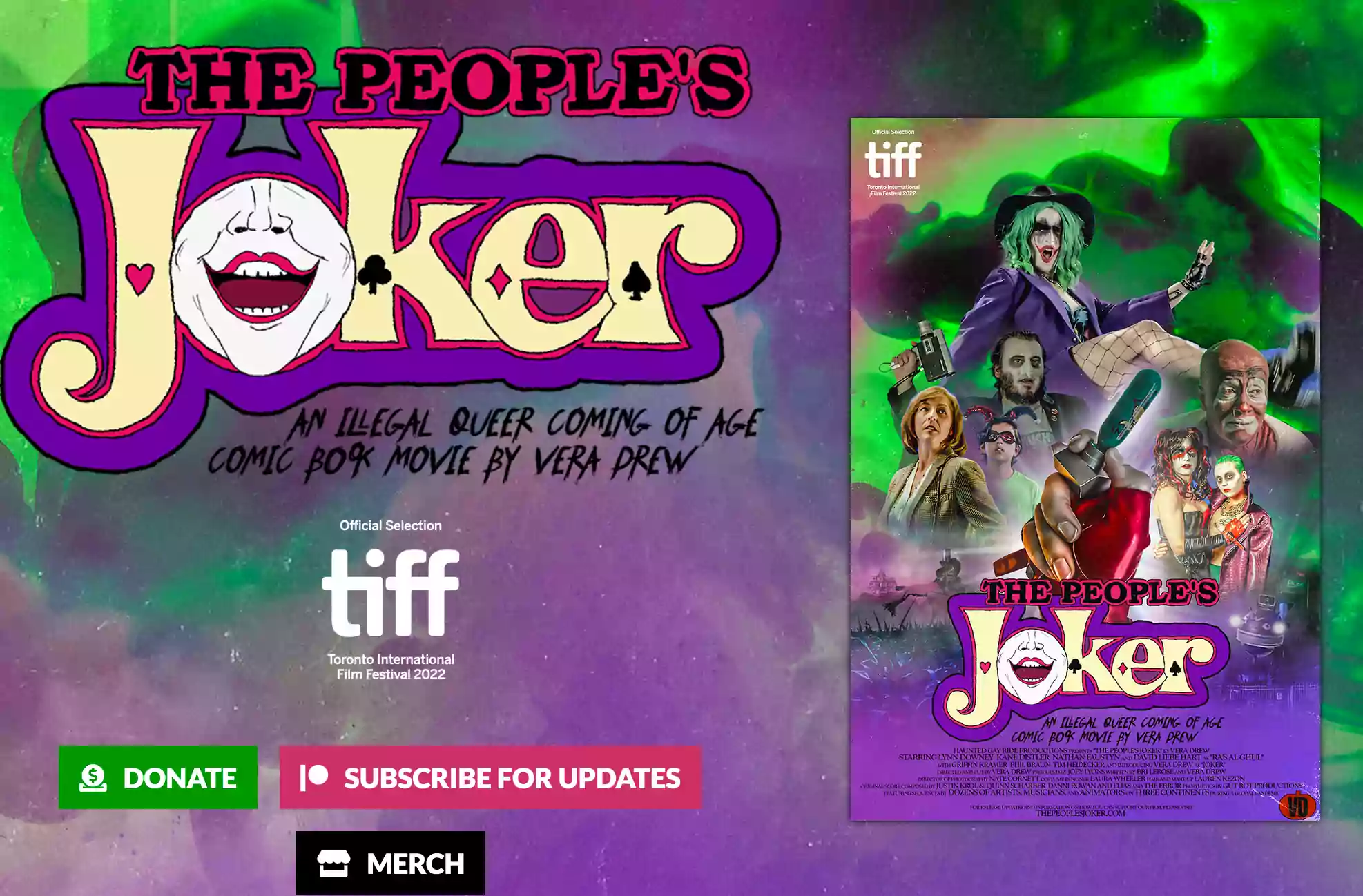Things We Love Blog
Vera Drew is the Joker-the-Harlequin we need

Credit: screencap of thepeoplesjoker.com
What is it: An illegal queer coming of age comic book movie we’re currently forbidden from seeing, which is also probably the best film set in the Batman universe.
Perfect for: Realizing corporate control keeps our fandoms from growing into majestic, batshit adulthood.
Unfortunately for us, we can’t say we love Vera Drew’s The People’s Joker, because we’ve never had the pleasure of actually seeing it. Conceived as an ‘illegal queer coming of age comic book movie’, the film retells the origin story of the Joker from a trans / transitioning perspective. It debuted with a midnight showing at the 2022 Toronto International Film Festival before having all remaining screenings canceled due to pressure from Warner Bros. Still, we love the trailer and unabashedly count ourselves as fans of the film-in-absence. Why? Because of the immense potential exhibited in the limited snippets of the project currently available to those cruising around the internet. It’s so good we can’t quite get it out of our heads. Take a look:
From the jump, the trailer invokes iconic elements drawn straight from the Batman canon: the gothic cemeterial arch of Arkham Asylum’s wrought iron gate, the familiar purple-on-green costuming of the titular Joker character, a scarecrow fluttering in a dark field. All of these are signifiers of an IP that, like many, we grew up admiring. As elder millennials, this included Batman: The Animated Series, the theatrical releases of the franchise during the early 90s, and even some old reruns of the Adam West iteration that made its way onto our tv set via nefarious over-the-air broadcast. In other words, we were there for the dark-yet-campy origin as well as the massive expansion of the types of stories Batman could tell, and continue to enjoy the more recent offerings to varying degrees.
It is from this perspective that we immediately swooned over Drew’s low-budget hashup of the Joker origin story as a mirror for queer / trans becoming. It brazenly injects a fresh impulse into the material, transforming the self-serving moralism that necessarily underlies even the Dark Knight’s variation on the superhero trope by exchanging the polarity of “good” vs. “bad” for something that is probably a lot less binary. The end result? We desperately want to see this film because of all the things it does that an authorized Batman flick likely never could: the use of arthouse cinema techniques, the employment of sharp-witted comedy born from both tragedy & critical engagement, and a willingness to be as messy as necessary. However, above all else, we want to watch this film because Drew loved the Batman universe enough to retell an echo of her own story through it. We believe the new Joker-as-Harlequin approach will engage with and deepen our understanding of those characters, which in turn would make us appreciate the original IP in new ways that enrich both source and reflection. For us, there is no doubt the work depicted in the trailer is transformative. It feels like a Nietzschean fever dream.
The legality of the project remains, we assume, open to debate. Drew maintains that the film is a parody protected by fair use under U.S. copyright law, having vetted it with legal counsel during production. Warner Bros. in turn seems to be challenging this position, with their argument based on the extent to which the project is or is not transformative enough from the source material to warrant such protections. It is unclear precisely what the status might be from the outside looking in, but based on recent reporting the film is still very much alive, playing in secret screenings as it undergoes further revision and edges its way (hopefully) back into wider public access.
Clearly, the political moment we find ourselves in contextualizes all of this. We’re in the midst of a decades-long civil rights expansion facing intense culture war backlash that routinely spills over into real violence against / political targeting of the LGTBQ community. Warner Bros. would no doubt like to carefully curate how it engages in this conflict, such as it does in the Harley Quinn tv series. This is precisely why Drew’s The People’s Joker is so provocative. It not only claims a democratic right to renegotiate Drew’s relationship to iconic cultural content on her own terms, but does so with the sheer audacity of pouring what must have been a vast amount of time, creativity, money, and other emotional resources into a highly contentious project. It simply doesn’t make any sense, which is why it is so amazing. Without her having done this, there would be less than absence: simply nothing. Instead, we have a film that must by definition defy the odds to claim the right to exist. Drew has done the unlikely: taken an iteration of core Batman IP into a realm where it exists among other artistic heavy-hitters ranging from Hedwig and the Angry Inch to Birdman: or The Unexpected Virtue of Ignorance. Did we already mention we really really want to see it?
